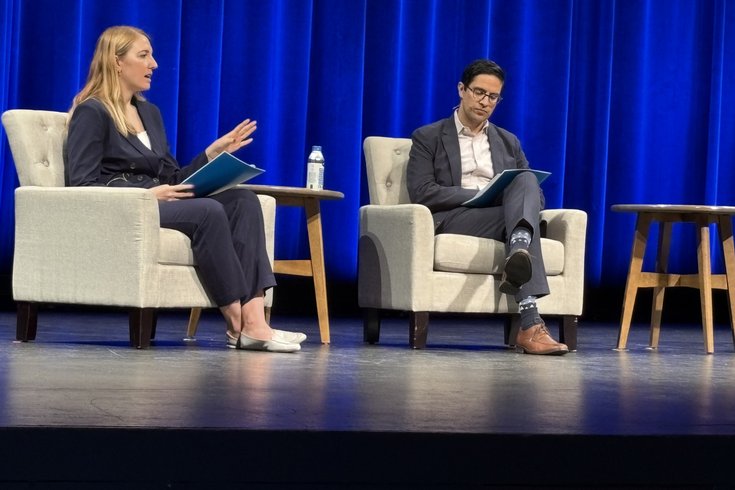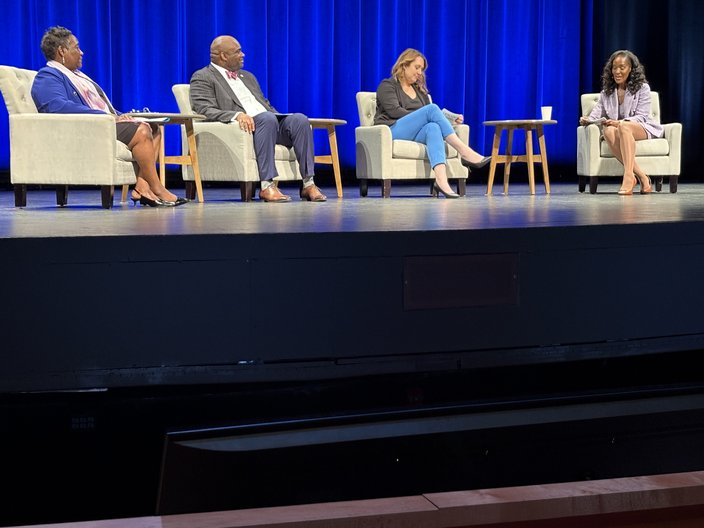
October 08, 2024
 Jon Marks/For PhillyVoice
Jon Marks/For PhillyVoice
Anna Heard, senior policy analysts at the National Governors Association, and Gindhar Maliya, senior policy officer at the Robert Wood Johnson Foundation, speak at the 'Catalyzing Change' health care forum hosted by the Independence Blue Cross Foundation on Tuesday.
Level the playing field.
That was the message of the "Catalyzing Change" event hosted by the Independence Blue Cross Foundation on Tuesday at the Kimmel Center. Attempt to right the wrongs built up by years of racial and gender discrimination in the health care system, so that the next generation doesn't have to deal with those same issues.
It's part of an ongoing effort to educate the public and emphasize to those who control the purse strings how critical this is.
"The important thing is to level the playing field so everybody can participate," IBX Foundation President Lorina Marshall-Blake said. "We have to find a way for them to all be at the table.
"It shouldn't matter your race, creed, gender, sexual orientation. Stop talking about what you're going to do and do something. ... Make sure those who don't have it will have it."
Her remarks followed two panel discussions that detailed the barriers at the local and national levels. The first featured three health care professionals who talked about everything from the way health care workers are assessed, to the joys of working with people from birth to death, to the fact that only one penny of every dollar given philanthropically goes to nurses.
"I think we're worth more than that given our value and our mission," said Roberta Waite, dean and professor at Georgetown School of Nursing, who was joined on the panel by Eliza E. Heppner, acting Deputy Associate Administrator for the Health, Resources and Services Administration, and Dr. Leon McCrea II, vice dean for educational affairs at Drexel University. "We have inequity right now because that's what we have designed.
"That's what our policies have to bear. We have an obligation to look at it."
Following that came a national panel featuring Anna Heard, senior policy analyst for the National Governors Association and Gindhar Maliya, senior policy officer, of the Robert Wood Johnson Foundation. They talked about the obstacles faced in overcoming inequity, especially in today's polarized political climate.
Roberta Waite, dean of Georgetown School of Nursing; Leon McCrea II, vice dean for educational affairs at Drexel University; Eliza Heppner, acting deputy health administrator for the Health Resources and Services Administration; and TaRhonda Thomas, a 6ABC reporter, take part in a panel discussion at the 'Catalyzing Change' health care forum hosted by the IBX Foundation on Tuesday.
"Our policies have been fundamental to racial inequities dating back to slavery and Jim Crow," said Maliya. "States are laboratories of democracy sometimes for better or worse.
"Every state has increased access to health care and there's evidence to show it is good investment.
"But when it comes to the focus on DEI (Diversity, Equity and Inclusion) there is a concerted, very well-funded effort in this country to portray it as divisive, illegal and un-American. Our people are dedicated to show that's a misconception. When DEI works, it has potential to benefit all of us."
Stephen P. Fera, executive vice president of public affairs at IBX, said things need to change now. He noted the IBX Foundation expects to have awarded more than $85 million by the end of the year, dating back to its inception in 2011.
"What we do with this is critical," Fera said. "If we don't, we'll be having the same conversation three, five or more years from now with no better results for the health care system.
"We'd better get busy."
Otherwise, the panels stressed, the playing field will continue being more and more uneven.
 Jon Marks/For PhillyVoice
Jon Marks/For PhillyVoice